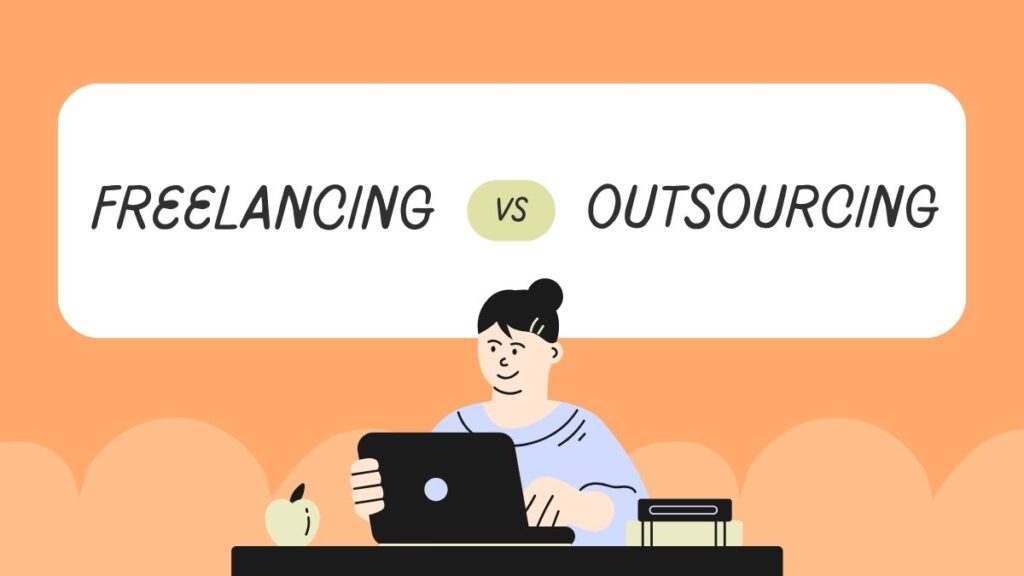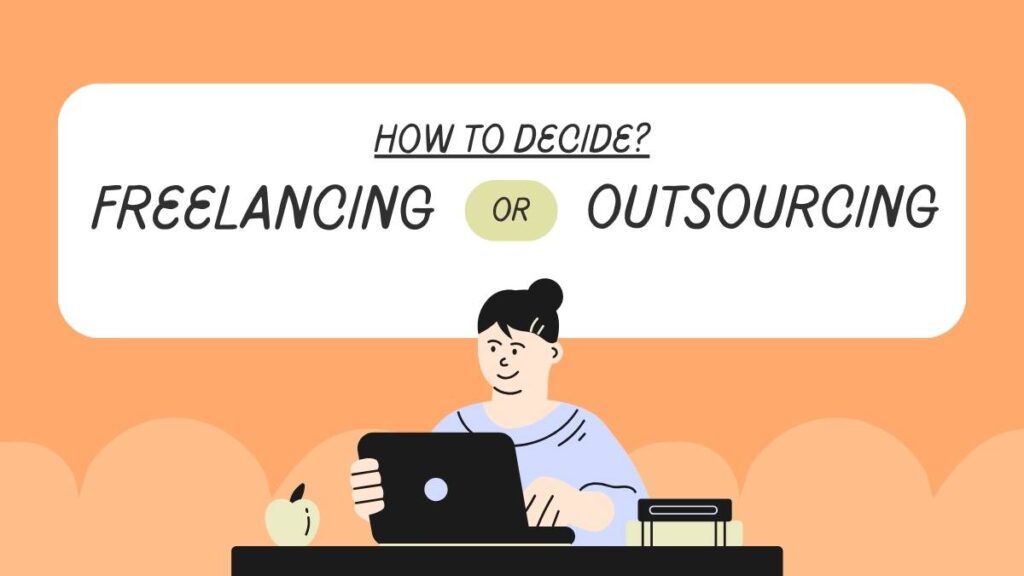
Freelancing and outsourcing are words often used interchangeably, but their meanings differ. In freelancing, a freelancer learns a specific skill, finds an online or local client, and then provides his own services to him.
Outsourcing is entirely different from this. In this, there is a company to which a client comes to get work done, but if that company does not provide the services required by the client, then it gets the work done by a third party. In this, he does the work for the client, pays the service charges to the third party, and keeps the money himself.
It is essential to know the difference between the two so that you can expect how much benefit there is in which work according to your expectations.
Key Features of Freelancing
Individual-Based Work
In freelancing, any individual can work independently, even if he is alone. A freelancer can also work on different projects at a time.
It depends on his skills whether he can do more work at the same time or not. If he cannot, then do one job because there is no boss in it. A freelancer works according to his schedule.
Skills and Services Offered
fFreelancers provide many services like content writing, web development, graphic designing, and many more. There are many platforms like Fiverr, Upwork, and Guru where freelancers can provide their services.
The more skills and experience a freelancer has, the more clients get him to work and pay him more than other freelancers.
Advantages of Freelancing
Freelancing gives freedom. There is no specific time to work on it; work when you feel like it, and if you don’t feel like it, rest. No fear of any boss, no fear of losing your job. In freelancing, you can earn more money than in your daily job and live a better life.
In freelancing, you don’t need to go to any office, you can work wherever you want. Through freelancing, you can make a name for yourself all over the world and you get clients from all over the world, due to which you grow and you can make a name for yourself in the whole country or the world.
Challenges Faced by Freelancers
Along with the benefits of freelancing, there are also many difficulties in it. You do not have a specific salary, which can cause difficulties. In freelancing, after finding a client, it is even more challenging to give him good work and keep him happy.
Often, clients stop working, so freelancers have to face very difficult situations. Freelancers have to do many things at the same time, such as finding clients, meeting with them, and finishing their work on time.
Key Features of Outsourcing
Business-Level Delegation
Outsourcing involves business delegation, in which work is done by another company or individual. They do this because if a client comes to them to do a job and they cannot do that job, they get that job done by someone else.
Due to this, they get good work done for less money, and time is also saved. The client who gave them the work also continues to work with them because they are fulfilling every need of the client.
Types of Tasks Commonly Outsourced
Businesses outsource many tasks, such as customer support, IT services, content creation, marketing, manufacturing, and human resource functions.
For tasks that require more technical and time-consuming tasks, most companies or businesses outsource those tasks to a third party to save time. It is cheaper for them and it benefits them.
Benefits of Outsourcing for Businesses
Outsourcing has many benefits, such as cost reduction, improved efficiency, and access to a global talent pool. Businesses focus more on their core functions due to outsourcing because businesses or companies get the core functions done by a third party. Due to this, companies grow faster.
Common Downsides of Outsourcing
Despite its benefits, there are some drawbacks to outsourcing. Communication barriers, quality control issues, and relying on outsiders can make the work less efficient. In particular, outsourcing can cost you your job if you give your business or company data to someone else.
Finding good people for outsourcing is also a difficult task because if the workers are experts in their work, the output will be good, otherwise, the company will suffer.
Freelancing vs. Outsourcing: A Detailed Comparison
Freelancing and outsourcing are two different ways of working in which the needs of a business or individual are met, or services are provided to them.
By looking at their detailed comparison, you will understand the difference between them.
Nature of Work
Freelancing is a type of work that relies on a single individual. An individual learns a skill and starts offering their services. That skill could be graphic designing, content writing, web development, or anything else.
A freelancer works independently. In contrast, in outsourcing, a business gives small tasks to another business, company, or agency, and in return, they get paid. It involves large-scale tasks such as IT support, manufacturing, or customer service.
Level of Control
Freelancers have more autonomy. They decide what skills to learn, what time to work, and whether to work from home, and they even tell clients the deadline for work.
In outsourcing, businesses give work and say that the work should be done before this time, work at this time, come to the office, and work, and the rest of the pressure is also from the business.
Cost Implications
Freelancing is the best for get small tasks done. It saves money and also saves time for businesses. It is better for businesses and companies to get such small tasks done by an expert in their field. There are no small tasks in outsourcing.
If a business wants to get any big work done, they go to an outsourcing company rather than a freelancer. Because such big tasks require a team, more than a freelancer is needed to provide such services.
The aim of both is to do good work for less money, but freelancing has small tasks and outsourcing has big tasks.
Risk Management
The risks of freelancing include not being able to work consistently, being late for work, or not being able to manage your work correctly.
Outsourcing involves the risk of your company or business’s personal information falling into the hands of someone else. In this, we are getting the work done by outsiders, so these risks arise.
Popular Use Cases
Freelancing provides the best services for creative and technical tasks such as content writing, graphic designing, programming, digital marketing, and more.
Outsourcing involves large tasks such as manufacturing, customer support, and IT infrastructure management.
How Freelancing Supports Outsourcing
Freelancing and outsourcing are very similar. To do any outsourcing work, freelancers are needed. Companies that provide outsourcing services have to hire freelancers themselves so that they can get work done by them.
Due to the cooperation between these two, outsourcing companies are successful, and freelancers also get work. In this way, they can also work at the international level because if expert people do good work, they will also get international work.
In this, both the freelancer and the outsourcing company benefit. Both get development.
The Role of Freelancers in Outsourcing Projects
Freelancers rely on their expertise to complete work well and before the deadline. Freelancers must have creative, technical, or administrative skills to complete outsourced projects.
Examples of Freelancers Working in Outsourced Roles
Freelancers are usually hired to outsource tasks such as content writing, graphic design, web development, customer support, and digital marketing.
For example, if a business has provided marketing services to an agency, it will ask the freelancers to create an ad campaign, improve it, and run ads for that agency. This is how freelancers work.
Industries Benefiting from Freelancing and Outsourcing
IT and Software Development
Freelancing and outsourcing play their respective roles in software development, app creation, and IT support.
Digital Marketing
Businesses rely on freelancers for their website SEO, ad campaigns, and content writing.
Content Creation and Writing
Freelancers write blog posts for their clients’ websites, do SEO, and do copywriting work to bring their websites to the top of Google search results.
Customer Support
Outsourcing firms provide their services 24/7 and also provide a chat for customer support. They hire freelancers to be online at all times so that they can provide assistance whenever there is a problem or a customer needs it.
How to Decide: Freelancing or Outsourcing?

Factors to Consider for Businesses
Businesses should look at the tasks first. If the work is related to content writing, graphic designing, or digital marketing, then hire a freelancer.
If the work is more extensive, like IT support, customer service, or manufacturing tab, then outsource it to a company. The goal of both is the same: save time, do a good job, and grow.
Factors to Consider for Individuals
A person who is thinking of a freelancer should first ask about the freelancer’s workload, skills, and independence. This may be fine later. Outsourcing is better for those who have to get big jobs done for good results and output.
The Future of Freelancing and Outsourcing
Trends Shaping the Gig Economy
The gig economy is growing as businesses look for flexible, cost-effective solutions to grow. Remote work, freelance platforms, and global collaboration are further fueling this work.
AI and Automation Impact
AI and automation are also changing the world of freelancing and outsourcing. There is also a growing space for freelancers in the field of AI.
Opportunities for Growth
Both freelancing and outsourcing are essential for growth. Businesses need to rely on marketing, content writing, and SEO to thrive.
Conclusion
Freelancing and outsourcing are essential to keep up with the new era economy. This allows any business to get good work done for less money. If the work is small, then get the work done by a freelancer and if the work is large and technical, then contact an outsource company.
By understanding the difference between them, you can decide who to get your work done by.

Pingback: Freelance Interpreting Rate Structure Ratio: A Complete Guide for Beginners - GUL EDU